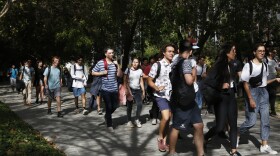Maria Paz Gutierrez
-
Each day, we breathe about 22,000 times--and all that time we smell. Scent historian Caro Verbeek recreates scents of the past. She says, just like music and art, smell is a part of our heritage.
-
Deep fakes are taking over the Internet—distorting our perception of what's real. Law professor Danielle Citron explains how deception online not only harms people, but also our democracy.
-
Over 30 million people in the U.S. have hearing loss. Neuroscientist Jim Hudspeth explains how the ear's thousands of hair cells function to amplify sound—and how they can be damaged but not repaired.
-
Flint, Michigan is the site of one of the worst ongoing water crises in recent U.S. history. Artist LaToya Ruby Frazier has spent years capturing the stories of life living with toxic water.
-
David Byrne says "context has a huge effect on creativity." He draws on his time with Talking Heads, as well as Bach, Gregorian chant, even birds—to show how spaces affect the music we write and play.
-
Former gymnastics coach Valorie Kondos Field led her team to victory by creating a supportive environment, instead of a cutthroat one. The impact of that decision, she says, echoes far beyond the gym.
-
For architect Grace Kim, the antidote to isolation is co-housing. She describes how she built a home—and a community—by designing an apartment building for her family and eight other families.
-
In 2016, Chile passed gratuidad, or "free college." As the idea gains popularity ahead of the 2020 presidential election in the U.S., Chile offers some lessons from what has happened there.
-
The Petronio Alvarez festival is the big event of the summer — five days of music and food and fashion. More than 100,000 people travel to celebrate Afro-Colombian culture.
-
In 1968, Congress passed the Fair Housing Act, which made it illegal to discriminate in housing. Gene Demby of NPR's Code Switch explains why neighborhoods are still so segregated today.






